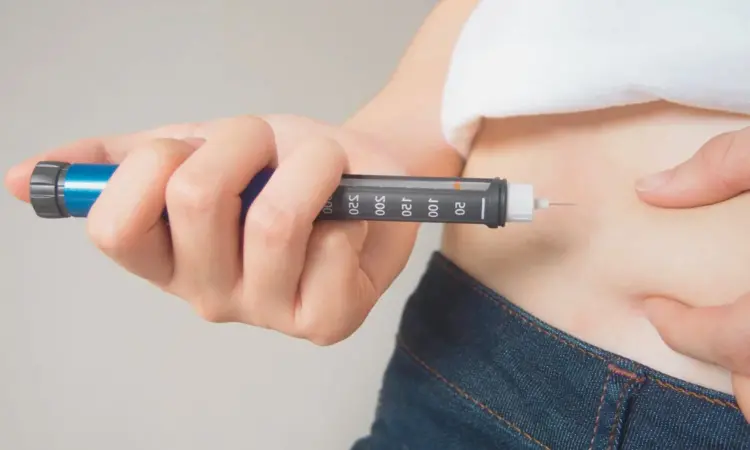- Home
- Medical news & Guidelines
- Anesthesiology
- Cardiology and CTVS
- Critical Care
- Dentistry
- Dermatology
- Diabetes and Endocrinology
- ENT
- Gastroenterology
- Medicine
- Nephrology
- Neurology
- Obstretics-Gynaecology
- Oncology
- Ophthalmology
- Orthopaedics
- Pediatrics-Neonatology
- Psychiatry
- Pulmonology
- Radiology
- Surgery
- Urology
- Laboratory Medicine
- Diet
- Nursing
- Paramedical
- Physiotherapy
- Health news
- Fact Check
- Bone Health Fact Check
- Brain Health Fact Check
- Cancer Related Fact Check
- Child Care Fact Check
- Dental and oral health fact check
- Diabetes and metabolic health fact check
- Diet and Nutrition Fact Check
- Eye and ENT Care Fact Check
- Fitness fact check
- Gut health fact check
- Heart health fact check
- Kidney health fact check
- Medical education fact check
- Men's health fact check
- Respiratory fact check
- Skin and hair care fact check
- Vaccine and Immunization fact check
- Women's health fact check
- AYUSH
- State News
- Andaman and Nicobar Islands
- Andhra Pradesh
- Arunachal Pradesh
- Assam
- Bihar
- Chandigarh
- Chattisgarh
- Dadra and Nagar Haveli
- Daman and Diu
- Delhi
- Goa
- Gujarat
- Haryana
- Himachal Pradesh
- Jammu & Kashmir
- Jharkhand
- Karnataka
- Kerala
- Ladakh
- Lakshadweep
- Madhya Pradesh
- Maharashtra
- Manipur
- Meghalaya
- Mizoram
- Nagaland
- Odisha
- Puducherry
- Punjab
- Rajasthan
- Sikkim
- Tamil Nadu
- Telangana
- Tripura
- Uttar Pradesh
- Uttrakhand
- West Bengal
- Medical Education
- Industry
Tirzepatide, novel agent for treating type 2 diabetes has different efficacy in Asians and non-Asians: Study

China: A recent meta-analysis published in Diabetes Therapy has shed light on the comparative safety and efficacy of tirzepatide in Asians and non-Asians with type 2 diabetes mellitus (T2DM).
Jianjun Dong, Shandong University, Jinan, Shandong, China, and colleagues revealed that tirzepatide is a novel agent for diabetes treatment and has different efficacy in Asians and non-Asians. They found that tirzepatide exhibited greater efficacy in regulating blood glucose levels among non-Asian patients versus Asian patients while demonstrating a more pronounced body weight reduction among Asian patients as opposed to non-Asian patients.
Concerning adverse events, Asian patients exhibited a higher incidence of gastrointestinal adverse events compared to non-Asian patients receiving the same dosage. Conversely, non-Asian patients showed a higher incidence of nutrition and metabolic disorders in comparison to Asian patients.
"Asians were more likely to experience gastrointestinal adverse events and weight loss, whereas non-Asians were more likely to have better glycemic control and more nutritional and metabolic disorders," the researchers reported.
There has been an increase in the incidence of type 2 diabetes mellitus (T2DM) in recent years and displays variations in pathophysiological mechanisms between Asians and non-Asians; Asian patients constitute more than half of the global patient population.
Tirzepatide is a novel treatment that acts as a dual agonist of GIP and GLP-1 receptors. The 2023 guidelines issued by the American Diabetes Association support tirzepatide as a favourable treatment option for patients with obesity and T2DM. However, there is no clarity on the safety and efficacy of tirzepatide in Asian or non-Asian patients with T2DM.
Against the above background, the research team aimed to provide evidence on the varying safety and efficacy of tirzepatide with different dose formulations for type 2 diabetes patients, looking for possible differences in safety and efficacy in Asians, considering the significant heterogeneity observed between Asians and non-Asians in terms of age of onset, BMI, and fat distribution. In the context of the study, Asian populations were represented by patients from China, Japan, South Korea, and India.
For this purpose, the researchers conducted a literature search in online databases for clinical studies of tirzepatide for type 2 diabetes. Two authors independently performed the data extraction process.
The systematic review and meta-analysis involved 2118 patients with T2DM from 6 studies, with tirzepatide doses ranging from 5 to 15 mg administered subcutaneously once weekly.
Based on the research, the researchers reported the following findings:
- Compared with the control/placebo, tirzepatide was more effective in decreasing fasting blood glucose (FBG) in non-Asians than in Asians, and 10 mg rather than 15 mg was the optimal dose to decrease FBG.
- Non-Asians were more effective than Asians in improving glycated haemoglobin (HbA1c).
- Asians were significantly more effective than non-Asians in reducing body weight and ≥ 5% weight loss.
- In terms of adverse events, the incidence of gastrointestinal adverse events was higher in Asians than in non-Asians at the same dose, while the incidence of metabolic and nutrition disorders was higher in non-Asians than in Asians.
"This paper adds to the growing body of knowledge showing different antidiabetic drug responses in Asians and non-Asians. Such studies if confirmed by other groups, could pave the way for precision treatment of obesity and diabetes which are rapidly rising globally in Asia," the researchers concluded.
Reference:
Cui, Y., Yao, J., Qiu, X. et al. Comparative Efficacy and Safety of Tirzepatide in Asians and Non-Asians with Type 2 Diabetes Mellitus: A Systematic Review and Meta-Analysis. Diabetes Ther (2024). https://doi.org/10.1007/s13300-024-01540-7
Dr Kamal Kant Kohli-MBBS, DTCD- a chest specialist with more than 30 years of practice and a flair for writing clinical articles, Dr Kamal Kant Kohli joined Medical Dialogues as a Chief Editor of Medical News. Besides writing articles, as an editor, he proofreads and verifies all the medical content published on Medical Dialogues including those coming from journals, studies,medical conferences,guidelines etc. Email: drkohli@medicaldialogues.in. Contact no. 011-43720751


